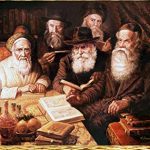The Reward for reading Shnayim Mikra:[1] All those which fulfill the Mitzvah of reading Shnayim Mikra by its proper time are given long days and years. Sparks of Kabala[2] Reading Shnayim Mikra merits a person to draw down a spirit of purity and receive the extra soul [which is […]
Shayim Mikra: Obligation & Importance, Segullos, fast versus slow, women, children
The obligation of Shnayim Mikra:[1] Although a person hears the reading of the entire Torah every Shabbos in a public forum, he is obligated each week to read to himself the Parsha of that week in the form of Shnayim Mikra Echad Targum [as will be explained].[2] [This matter is […]
Learning and other activities
Learning and doing other activities on Erev Shabbos:[1] One is to slightly diminish the amount of his learning on Erev Shabbos. It goes without saying that one is to diminish from doing other activities.[2] Yeshiva on Erev Shabbos: [Due to the above requirement to diminish in ones learning on Erev […]
Forms of work
The forms of work that are forbidden to be done past Mincha:[1] The Sages only forbade one to do forms of work which fulfill all the following conditions: Melacha Gemura: The work is a complete form of work. [Meaning that it involves laborious activity, as opposed to a job which […]
Doing work on Erev Shabbos and Erev Yom Tov
Important note: Although one may do work on Erev Shabbos until the time to be mentioned below, he nevertheless is to prepare for Shabbos prior to this time, as explained in the previous chapter[1] and as is evident from the story told by Rav Yehuda Hachasid[2]. The law: [3] The […]
Mincha on Erev Shabbos
Saying Hodu:[1] It is a custom established from the Ball Shem Tov to recite psalm 107 prior to the Mincha prayer.[2] Hodu is omitted prior to Mincha Erev Shabbos which is also Yom Tov or Chol Hamoed.[3] [Some communities are accustomed to recite Hodu together with a Minyan.[4] This is […]
Accepting joyfully
Accepting Shabbos with joy:[1] One is to wear elegant clothing and rejoice in the coming of Shabbos like one is going to greet the king, and like one who is greeting a bride and groom. This was the custom of the greatest of our Sages which would garb themselves in […]
Checking pockets
Checking ones pockets close to Shabbos: [1] It is a Mitzvah[2] upon every person to check his clothing[3] on Erev Shabbos, in close proximity to the beginning of Shabbos. This is done in order to verify that he is not carrying anything which is forbidden to carry[4] on Shabbos.[5] [This […]
Carrying close to shabbos
Carrying an object close to the start of Shabbos:[1] The public area is defined as a Reshus Harabim: It is forbidden for one to carry an object in his hand [or pocket[2]] into a public domain which is defined as a Reshus Harabim very close to the start of Shabbos.[3] […]
Shabbos reminders
Reminding ones household that Shabbos is near:[1] Slightly[2] prior to sunset, one is to caution his household that they should light the candles and cease from doing any forbidden work. Likewise, if one’s wife baked Challah [as is required due to the custom] then slightly prior to sunset it is […]


